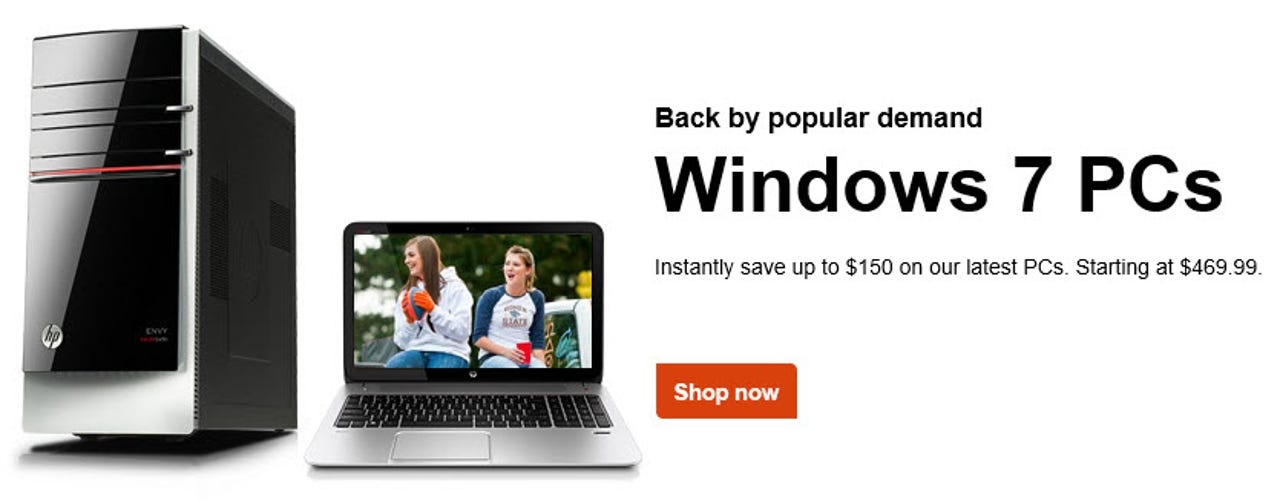HP bringing back Windows 7 PCs? Not so fast...

Repeat after me: An advertising slogan is not news.
A few tech journalists need to be reminded of that rule today, after piling on to the story that HP is bringing Windows 7 back “by popular demand.” The proof? This bit of selling copy on the landing page at HP’s Home and Home Office site:

If HP really had bowed to public pressure and brought Windows 7 back after abandoning it, that might be news. But this is nothing new. It’s a clever pitch by HP, not a change in sales strategy.
Under Microsoft’s sales lifecycle, big OEMs like HP can continue to sell Windows 7 PCs until at least October 2014. Every major PC maker takes advantage of that opportunity, continuing to offer a selection of Windows 7 PCs today. In addition, business buyers can purchase a PC with a Windows 8 Pro license and exercise downgrade rights to run Windows 7 instead. That’s a longstanding policy that Microsoft has allowed for more than a decade.
See also:
- Where can you still find a PC running Windows 7?
Hint: Skip the office superstores and big-box retailers and
go where the business buyers go, to the commercial channel.
I know a little bit about this subject, having surveyed the major PC makers last April, six months after the launch of Windows 8. (See Where can you find a PC running Windows 7?) At the time, I wrote:
[Y]ou can still find a Windows 7 PC if you want one. In fact, you have plenty of choices, and you will continue to have choices for a long time — at least until October 2014, more than 18 months from today. You just need to look in the right places. (Spoiler alert: Stores that cater to businesses will be your best bet.)
Nothing has changed since then, especially at HP. A quick check at the Internet Archive finds that the company was never forced to stop selling Windows 7 PCs. In fact, Windows 7 models have routinely been featured at HP.com since the release of Windows 8. Last August and September, for example, this box appeared at the top of HP.com, in the same marquee location where this week's sales blurb is located:
That teaser was on the HP home page for a full week. No one noticed, I guess.
(And don’t let that “limited quantities” wording fool you. That’s a time-honored technique used by marketers to convince you to buy right now. You don’t want to get shut out, do you?)
In fact, HP continued selling Windows 7 PCs from its Home and Home Office website until at least late October. The business sites (Small & Medium Business; Large Enterprise; and Government, Health & Education) have offered Windows 7 PCs continuously. During the holiday season, HP focused its selling to consumers on Windows 8 and 8.1 PCs. It wasn't until a few weeks after the holiday rush ended that the "Windows 7 is back" campaign began.
If you want real proof that HP is simply mixing up its sales pitch, you can look at its mix of products. Like many of its competitors, HP offers filters on its online shopping site that allow you to narrow your search. One of those filters is Operating System. Today, January 20, 2014, that box indicates the mix of different PC models available in the desktop and laptop categories. Thanks to the wonderful folks at the Internet Archive, we can use the Wayback Machine to look at the exact same selection from a previous date and time.
Table: HP's mix of operating systems on PCs sold online
| Operating System | August 2013 | January 2014 |
| Laptops/Hybrids | ||
| Android | 1 | 1 |
| Chrome OS | 2 | 5 |
| Windows 7 | 4 | 2 |
| Windows 8.x | 31 | 35 |
| Desktops/All-in-ones | ||
| Android | 0 | 1 |
| Windows 7 | 4 | 3 |
| Windows 8.x | 30 | 33 |
Those numbers are not a mistake. In January 2014, HP offers a total of 5 PCs running Windows 7 and 68 running Windows 8 or 8.1. Last summer, HP offered 8 Windows 7 PCs and 61 Windows 8 models. Back by popular demand? Not exactly.
That makes headlines like "HP was forced to start selling Windows 7 again" unintentionally hilarious.
Under Microsoft's support lifecycle (which is separate from its sales lifecycle), Windows 7 is in mainstream support for another year and in extended support for five years after that, until 2020. Businesses, which are historically conservative about OS upgrades, have continued to buy and deploy Windows 7 PCs while Windows 8 models predominate in retail sales channels.
In 2013, HP's PC business stumbled badly, with worldwide sales down 10.3 percent and U.S. sales down 9.4 percent according to IDC's just-released Worldwide PC Tracker report. That's in contrast to Lenovo, which overtook HP as the top seller of PCs worldwide last year with an annual sales increase of 2.7 percent worldwide and a rise of 17.5 percent in the United States.